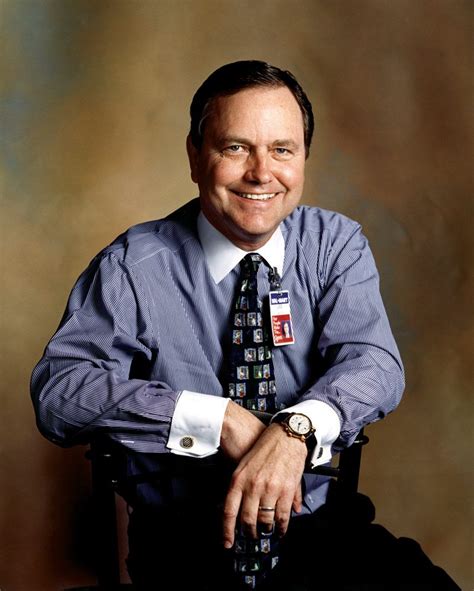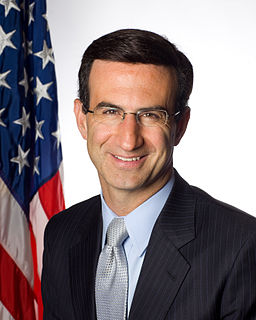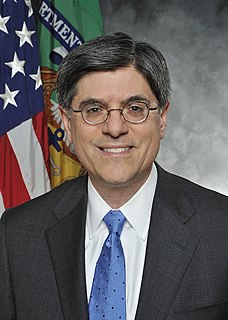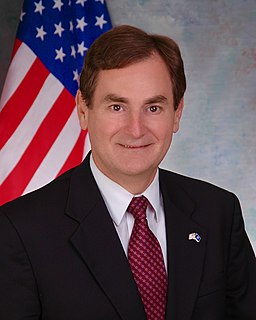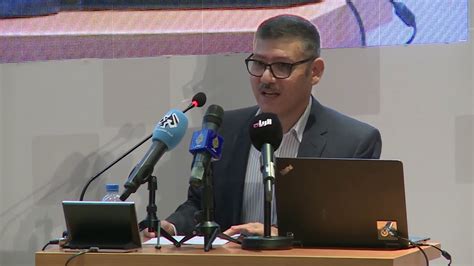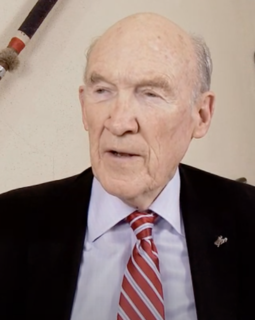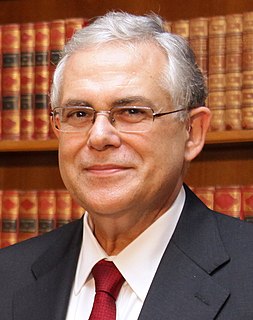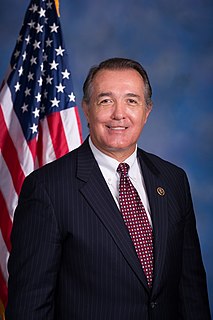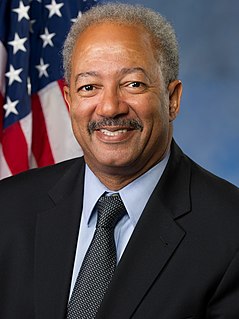Top 1200 Fiscal Policy Quotes & Sayings - Page 15
Explore popular Fiscal Policy quotes.
Last updated on December 19, 2024.
I am of the view that the Affordable Care Act will be a transformative piece of legislation that can lower the cost of health care in the United States - perhaps our greatest fiscal obstacle - and help all Americans lead healthy and productive lives, free from worry that a single illness could mean ruin for an entire family.
I am glad that Congress has recently authorized $800,000 to State welfare agencies to expand their day-care services during the remainder of this fiscal year. But we need much more. We need the $8 million in the 1965 budget for the Department of Health, Education, and Welfare allocated to this purpose.
Today it is evident that we have two political parties: the Tax and Spenders and the No-Tax and Spenders. Neither party is fiscally conservative. Is there no room at the inn for an honest conservative? A conservative who makes the case for smaller government on its merits and not just as the fallback option when fiscal bankruptcy threatens?
I have young kids. The fiscal burden that will be imposed on them is going to depend primarily on whether we tackle this looming problem in our health care system - with rising costs that don't seem, by the way, to be necessarily associated with higher quality. That is the key burden that they will face.
We cannot win the future, expand the economy and spur job creation if we are saddled with increasingly growing deficits. That is why the president's budget is a comprehensive and responsible plan that will put us on a path toward fiscal sustainability in the next few years - a down payment toward tackling our challenges in the long term.
Clinton is a very capable, conscientious person. I think she cares very deeply about policy. She knows a lot about how the government works, and I think those things are very important. You don't really appreciate those things until you get a guy like George W. Bush in the White House, and then you realize that when you don't have someone who knows or cares about government policy, a lot of bad stuff can happen.
I think the best thing we can do is sell that idea of smaller government - of fiscal responsibility vs. the Obama record. Obama made promises, and on every promise in which he's actually delivered, things have gotten worse instead of better. He said if we get ObamaCare it'll help, but health care prices went up.
There is a lot of fiscal conservatives in the United States senate that didn't vote for that because we understand that national security spending is not the reason why we have a debt. Our debt is being driven by the way Social Security, Medicare, and Medicaid and, by the way, the interest on the debt is structured in the years to come.
Some blame the drug companies. I don't. They are corporations. Their managers are ordered by law to make money for the corporation. They push a certain patent policy not because of ideals,but because it is the policy that makes them the most money. And it only makes them the most money because of a certain corruption within our political system-a corruption the drug companies are certainly not responsible for. The corruption is our own politicians' failure of integrity.
Materialism is not fundamentally an economic problem, but a cultural one... a spiritual issue. It runs to the depths of our souls, and, for this reason, needs to be understood less in terms of budgets or fiscal cycles and more in terms of where we locate the sacred, of where we search for meaning and transcendence, and of how we think about justice, equality, and the future of our world.
Now, I can't help but feel inferior. When I'm out in public in Afghanistan, I feel inferior because I'm doing everything I can to stay hidden, silent. I feel inferior because I am seeing firsthand the impact of America's foreign policy and can't help but feel like a living, breathing representation of that - despite my own personal views about that policy. It reinforces to me that I want to be part of the solution - and I want my work to be part of the solution - not part of the problem.
Ayatollah Khamenei actually is not the most powerful person in Iran. He does not make nuclear policy. He does not make security policy. He is one voice among many and not even the most important voice by any means.When nuclear strategy is being discussed in Iran, he is not the dominant figure to make things happen. So I think this sense which he has created to a considerable degree by his own self-promotion has made him the center of attention when, in fact, the real center of activity is some place else.
I think the problem with John Bolton is he disagrees with President Trump's foreign policy. He would be closer to John McCain's foreign policy. John Bolton still believes the Iraq war was a good idea. He still believes that regime change is a good idea. He still believes that nation-building is a good idea.
Long-term economic growth depends mainly on nonmonetary factors such as population growth and workforce participation, the skills and aptitudes of our workforce, the tools at their disposal, and the pace of technological advance. Fiscal and regulatory policies can have important effects on these factors.
Aggregate aid is to the Ethiopian economy what Obama's fiscal stimulus was to the American economy: minus these injections, both economies would suffer catastrophically. The theatrical blustering of the Ethiopian government notwithstanding, donor countries have a make-or-break power over the Ethiopia's prosperity.
I believe, as a matter of principle, that the debt is a problem that must be addressed sooner rather than later. I also know that fundamental changes are needed in the way Washington spends and taxes if we truly want a healthy economy. This must include changing our government's long-term fiscal path, which is unsustainable.
But these days, there's also a strong economic argument for doing away with capital punishment. With California facing its most severe fiscal crisis in recent memory... it would be crazy not to consider the fact that it will add as much as $1 billion over the next five years simply to keep the death penalty on the books.
The view that we know less than we thought we knew about how to change the human condition came, in time, to be called neoconservatism. Many ... , myself included, disliked the term because we did not think we were conservative, neo or paleo. (I voted for John Kennedy, Lyndon Johnson and Hubert Humphrey and worked in the latter's presidential campaign.) It would have been better if we had been called policy skeptics; that is, people who thought it was hard, though not impossible, to make useful and important changes in public policy.
So let us take our fair share of the true refugees and act responsible as a government in providing for their necessary expenses. Let us stop skewing the whole process by taking some folks who are not truly refugees in order simply to meet our foreign policy needs or domestic policy demands. There has to be a better way to meet those needs and demands than we are doing now. I think it is embarrassing to all of us who truly know the mission of the Refugee Act.
As the Eurozone takes steps towards closer fiscal and economic integration, and as the E.U. continues to develop, we need to be absolutely clear when it is most appropriate to take decisions at the national or local level, closer to the people affected, and in other cases when it is best to take action at the E.U. or global level.
I will not accept a new wave of fiscal retrenchment, of belt-tightening, without asking people at the top to make their contribution, to make an additional contribution. I don't think you can ask people on middle and low incomes, who, after all, are the vast majority of the British population, to bear the brunt of this adjustment.
Subsidiarity is the principle that government works best most responsibly and responsively when it is closest to the people it serves and the needs it addresses. Fiscal accountability is the principle that institutions collecting and disbursing taxes work most responsibly when they are transparent to those providing the money.
History speaks pretty clearly that the markets do better with Democrats. Republicans' ideas of what constitutes fiscal responsibility simply are not good for the stock market. Democrats have many tendencies, but one of them is to look after the workers, and actually that tends to be good for demand and good for markets.
I'm a big defense hawk and a big fiscal conservative, but in this case, Pakistan continues to imprison the man who gave us Osama bin Laden and continue to have a major ideological bent within the middle echelons of their government that, I think, should cause all of us pause given the size and nature of their nuclear arsenal.
Following Greece's defeat at the hands of Turkey in 1897, Greece's fiscal house was entrusted to a Control Commission. During the 20th century, the drachma was one of the world's worst currencies. It recorded the world's sixth highest hyperinflation. In October 1944, Greece's monthly inflation rate hit 13,800%.
I am willing to work with anybody who wants to have a serious conversation about our fiscal future. We're not going to do this under the threat of blowing up the entire economy. I will not negotiate over Congress' responsibility to pay the bills that have already been racked up. I don't know how I can be more clear about this.
We thank those Senators, both Republican and Democrat, who stood firm against tremendous pressure from the Bush administration, pro-drilling members of Congress and their allies in the oil industry. They recognize that the budget is an inappropriate place to decide controversial national policy matters like America's energy policy. We urge all members of Congress to remain steadfast in their belief that the vast, unspoiled wilderness of America?s Arctic National Wildlife Refuge is more than a line item in the Federal Budget.
The culture of the State Department is very negative towards a conservative foreign policy. And the model that we all have, of civil servants as neutral careerists who carry out the policy of the elected president, doesn't work nearly the way it should in the State Department. So that there are many people who want to be good civil servants, who want to try and carry out these policies, but are afraid to do so. And I'm not even counting the very small number of conservatives in the State Department who are genuinely at risk.
I am specifically concerned about the idea that the legislative process is one that gets characterized the way it is as the 'fiscal cliff.' At the end of the day, the United States is the biggest economy in the world, and the dollar is the reserve currency in the world. I think it behooves us to act in a much more responsible way.
My approach to cutting spending as president, is to do a ten percent across the board cut of all federal agencies, and then ask each of my new agency heads to find another ten percent by drilling down. That's what you do in business to come up with approximately 20 percent cuts for the first fiscal year budget.




